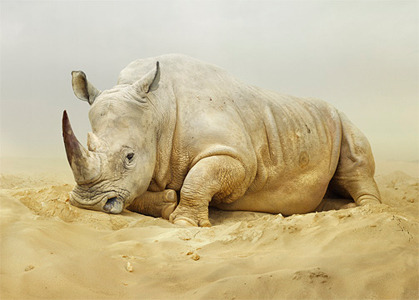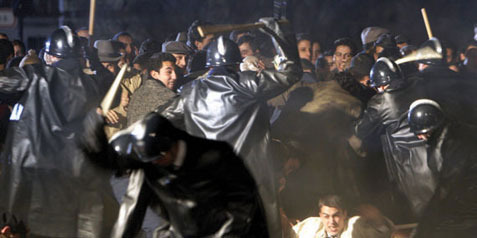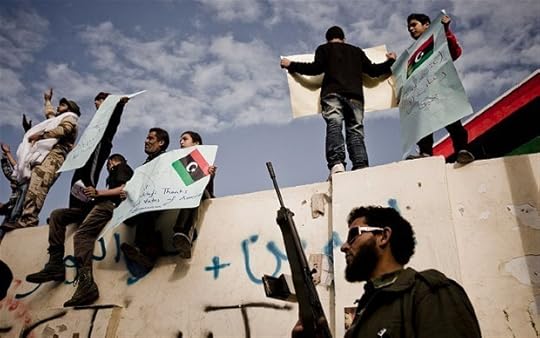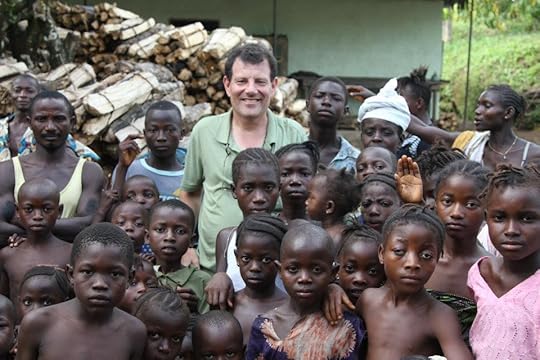Sean Jacobs's Blog, page 602
October 17, 2011
Music. Ghostpoet
Ghostpoet (government name: Obaro Ejimiwe) is a rapper from Coventry. The video for his latest, "Liiines," came out last night. I prefer the video and song for "Survive It" better. There's also "Us Against Whatever."
[image error]



 [image error]
[image error]


The French Algerian Massacre
Today marks the 50th anniversary of the "French-Algerian Massacre," when at least 200 Algerians living in Paris were killed by French police and another 11,000 or so were arrested while protesting for Algerian independence from France.
Nabila Ramdani (in The Guardian) reminds us that "many of the killers had been Nazi collaborators who learned their crowd control methods from the Gestapo" and not much has changed in terms of the living conditions and treatment of French-Algerians living in Paris today. Curfews in the banlieues (some of which were the sites of massive protest in 2005), unemployment, police brutality and abuse of the old Algerian war legislation prevent Algerian citizens of France from living freely.
The last time I was in Paris was during the 2006 World Cup (I was cheering on Zidane and my French is much better than my German). I had gone out with some friends who lived in Les Ulis, a banlieue which ironically houses many corporate headquarters. After a few hours of post-match euphoria, I decided it was time to go home … only to be informed that we were locked in the neighborhood for the evening.
The chains keeping poor residents in the projects are no surprise to anyone visiting France from a former African or Caribbean colony. Though France does not "officially" recognize race, the term "Muslim" has been bandied about for decades to describe the flood of 'undesirable citizens' from the colony to the metropole. While a number of Senegalese, Algerians and others do identify as Muslim, popular culture (such as Marie Ndiaye's novel Trois femmes puissantes and Mathieu Kassovitz's film La Haine) provides a more nuanced understanding of who receives second-class citizenship in the country, often, of their birth (Hint: They don't look like Carla Bruni).
It is in this context of the increasingly violent rhetoric surrounding issues of citizenship and immigration in the original "post-racial" society that Algerians and their allies today remember the events of 17 October, 1961. We are still waiting for the French government to acknowledge their responsibility for this massacre and many others, but we will likely be waiting for quite a bit longer.
[image error] [image error] [image error]

 [image error]
[image error]


Coldplay in the Karoo
Is that an elephant's trunk prop Coldplay's featuring in the music video for their Paradise song of the new album? They recorded it in the South African Karoo while on tour there this month. Elephants in the Karoo. Yeah. (Let's hope there's no choirs or poor children in the video.)
No video


 [image error]
[image error]


 [image error]
[image error]
Being Black in Germany
Sharon Dodua Otoo is hoping to edit the book series 'Witnessed', written in English by black authors, who live or have lived in Germany. She says:
The idea for the series came to me one day as I thought about how little people know about life in Germany as a Black person – or how dated this knowledge is. Even within Germany, discourse around ethnicity and diversity goes something like this: "if the foreigners learn German, they will integrate then there will be no problems". And yet, Black people have lived in Germany for over 300 years. Black Germans can be found in all fields from science to art, from education to sport, from music to entrepreneurship. Where there are problems, these rarely have to do with lack of proficiency in the German language. It is (…) incredible how little voice Black people within Germany have, despite decades of activism, academic research, creative publications and performances. So I thought – fine! If we don't find recognition within Germany, we surely can on an international stage.
There are also these video presentations of some of the project participants: Philipp Khabo Kopsell, Joshua Kwesi Aikins and Mirjam Nunning.
All the details here.
 [image error]
[image error]






"A writer in a revolution"
Libyan writer Hisham Matar (he has a new novel out), in an interview with Hari Kunzru for this month's Guernica Magazine, on "the effect of totalitarianism on personal lives":
Hisham Matar: … I feel that, since the fall of the Libyan dictatorship, something radical has changed. It has influenced the way that I deal with my loved ones, the way that I deal with myself, with my body. For example, there is the generation of Libyan writers that were imprisoned collectively in the late '70s…
Hari Kunzru: This is an extraordinary story—Qaddafi invited everybody to a literary festival, and then arrested them all, and people were given a sentence up to ten years.
Hisham Matar: On average, yes, ten years. And they were all in their mid-twenties up to their early thirties. So to me, that story is moving only to a certain extent. It was after learning of certain details that I was moved very deeply. I have two friends who were part of this disastrous event and they were in the same cell. And they were allowed once a week to go out and shower, and there's a very long line to the shower because there aren't enough cubicles for all these guys. And one of my friends—who's the better writer, I have to say—
Hari Kunzru: I love that this is significant… [Laughs.]
Hisham Matar: He would spend always too long in the shower.
Hari Kunzru: Ah.
Hisham Matar: And one day my other friend just couldn't bear it anymore. He says "For God's sake, come on—get out of the shower!" And my friend says to him, "But this is my body." Huh? That's enough. For me, that's enough. That for me says more about the event and more about the reality.
Read the rest here.
h/t zunguzungu








The Human Fantasy

Artist Simen Johan photographs a variety of plants and animals in natural preserves, zoos, farms, museum dioramas or his own studio,then "resituates them digitally into new environments constructed from images photographed elsewhere." The new work, Until the Kingdom Comes, is on display from November 3 to December 23 at the Yossi Millo Gallery in Manhattan.
For Johan, the images, " … depict an unsettling natural world hovering between reality, fantasy and nightmare. Johan merges traditional photographic and sculptural techniques with digital methods."
While some photographs in the series reference Biblical motifs, Johan says that his choice of title, Until the Kingdom Comes, "refers less to religious or natural kingdoms and more to the human fantasy that one day, in some way, life will come to a blissful resolution. …In a reality where understanding is not finite and in all probability never will be, I depict 'living' as an emotion-fueled experience, engulfed in uncertainty, desire and illusion."




 [image error]
[image error]
[image error]
[image error]

October 15, 2011
Contro'Versy
Tonight, the Afrikaaps crew, the South African musical about the history of the Afrikaans language, dedicated their last show in Holland to slain rapper Mr Devious; Michael Miranda, Shaun Magmoed and Jonathan Claasen, the three youngsters who died this day 26 years ago during the Trojan Horse Massacre; and to rapper Contro'Versy, who passed away yesterday. Salutasies.
[image error] [image error]
 [image error]
[image error]




You need Nicholas Kristof
By Dan Moshenberg
O my friends, there is no friend! If you're an African girl in trouble, there are only two things you can rely on. Your courage … and Nicholas Kristof. At least, that's what Kristof would have us believe.
The story Kristof tells is the story he's told before. This time he's in Sierra Leone. A 15-year-old girl named Fulamatu is raped by her neighbor. This happens repeatedly, and Fulamatu remains in terrified and terrorized silence. She loses weight, becomes sick. Finally, when two girls report that the pastor had tried to rape them, Fulamatu's parents put two and two together, and asked their daughter, who reports the whole series of events. They take her to the doctor, where she is found to have gonorrhea. Fulamatu lays charges against the pastor, who flees.
That's where Kristof comes in.
Fulamatu has the idea of having Kristof arrange, by phone, to meet with the pastor. The pastor shows up. The police arrest him. But it doesn't end there. The pastor's family comes to Fulamatu's parents and begs forgiveness. The father agrees. The mother agrees. Then the mother "offers" to send Fulamatu away, to a distant village, one without a school. Then the father kicks the daughter out, but `fortunately' Fulamatu has Kristof's cell phone. She calls him just before the parents take the phone away. Later, Fulamatu is let, begrudgingly, back into the house, but the situation remains `fluid.'
This story is framed as part of the crisis of sexual violence, and child rape in particular, in Sierra Leone, in a delicate post-conflict zone. The only problem is that, except for the presence of celebrity witnesses, this story takes place across the United States, across Canada, across Europe. Girls are raped by family friends and by family members … everywhere. More often than not, they stay silent, sometimes forever. If they do speak, they are regularly abandoned or betrayed by surrounding adults who should care, from adult family members to police to the courts to the community and neighborhood, and beyond.
More disturbing is Kristof's solution. He argues for US Congressional passage for the International Violence Against Women Act, but his story suggests a more important line of action. The story says, if you're Black and a girl, in `a place like Sierra Leone', you better have the phone number of a prominent White American Male. You need Nicholas Kristof.
That solution conveniently ignores, or erases, Sierra Leonean history. Fulamatu is indeed a courageous girl, and she is part of a history, in Sierra Leone, of courageous, hard working, truth telling, peace making girls and women. Some are in public office, like Jariatu Kamara or Mary Musa. Some are in groups that monitor public processes and empower and education women into becoming and remaining office holders, such as the 50.50 Group, a partner of WIPSEN – Africa, founded and led by Leymah Gbowee. Some of them are young women in their own movements, like Elizabeth M. Katta, of Young Voices, an organization that pushed the Sierra Leone government, in 2009, to sign the UN Convention on the Rights of Persons with Disabilities. Some are advocates and attorneys, like Sabrina Mahtani, who work with women prisoners, to secure due process and, often, freedom. Some are businesswomen, like Admire Bio, pushing and shoving to close the gender gap … and then some. Some are village women, like Yatta Gambai, who journeyed to India to study how to bring solar energy back to the villages and now are doing just that.
Some are peacemakers, like the members of the Women's Movement for Peace in Sierra Leone or the unnamed hundreds of Sierra Leonean women who journeyed to the Great Lakes region of the Democratic Republic of Congo to march for peace, to march for an end to violence against women. Some are women, like Hawa, struggling with a health care system that, on one hand, is free and, on the other, still doesn't deliver, especially when it comes to pregnant women and girls. Some are women farmers, targeted by major land grabs, struggling to resist and do better than survive. Not one by one. In groups and movements.
Sierra Leone is a tough place for women and girls, maybe among the worst. But that does not mean that the courageous ones are alone, any more than anywhere else, or that they're waiting for Nicholas Kristof's phone number. Another narrative is possible.
[image error]




 [image error]
[image error]

October 14, 2011
Music Break. Lianne La Havas
Nerina Penzhorn likes this. That means I should too. The very young singer, Lianne La Havas, walks the streets of Paris and sings.



 [image error]
[image error]
 [image error]
[image error]

Rick Perry's 'Dark Continent'
The more we learn about Rick Perry–whose campaign for US President seems to be stalling–the more we're not surprised. This week we learn that Perry grew up in an almost all-white rural area in Texas where many referred to slingshots as "niggershooters." And last week we learned of his hunting buddies:
After Rick Perry stopped visiting his N—-rhead camp, he still went hunting—with N word–using rocker Ted Nugent and a hunter whose best trophies came from what he calls "The Dark Continent" of Africa.
H/T: Brett.
[image error] [image error]

 [image error]
[image error]



Sean Jacobs's Blog
- Sean Jacobs's profile
- 4 followers









